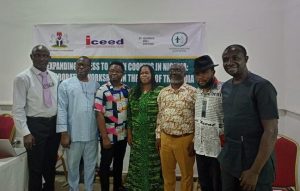Only one in 10 households in Nigeria uses clean energy sources and technologies for cooking
To address the socio-economic consequences of this hidden energy crisis on the lives of the citizenry, the International Centre for Energy, Environment, and Development (ICEED) has asked the media for help in raising awareness of the benefits of clean cooking alternatives in the country.

The reason for this call is to draw attention to the fact that traditional cooking methods that rely on firewood and other harmful fuels like kerosene and charcoal are taking lives daily. This, the foundation believes, will help people understand and adopt clean cooking sources to improve livelihoods, empower women, save lives, and ultimately fight climate change.
It bemoaned the fact that, despite all of the benefits, clean cooking adoption by homes and institutions has been comparatively slow, with most of this being attributed to a lack of awareness of these benefits.
“Heads of households often do not know the value proposition that cleaner cooking solutions bring,” Mrs. Precious Onuvae, the research manager at ICEED, said.
Mrs. Onuvae, who made the statement at a workshop her organisation hosted in Abuja on Thursday, November 30, 2023, to understand how to collaborate with the media to expand access to clean cooking in Nigeria, stated that the role of the media must be re-defined to speed up the transition to cleaner and more cost-effective cooking energy for all Nigerians.
According to her, this is critical to helping the country meet its Nationally Determined Contributions (NDCs) and Sustainable Energy for All (SE4ALL) Initiative targets.
Nigeria is firmly committed to expanding biomass cookstoves for 13% of families and delivering liquefied petroleum gas (LPG) to 48% of households by 2030 in its amended NDCs. If this is successfully accomplished, the research manager at ICCED believes it will help prevent deforestation, create new job opportunities, develop a clean cooking industry in the country, and save over 30,000 lives annually.
In a similar vein, Salu Ibrahim, the director in charge of the energy management department at the Energy Commission of Nigeria (ECN), asserted that having access to clean cooking is more than a matter of convenience; it is a fundamental right with significant implications for public health, the environment, and socioeconomic development.
While recognising the media’s critical role in shaping perceptions, disseminating information, and driving meaningful change, he urged that the media be engaged in novel ways to promote clean cooking solutions, advocate for policy reform, and inspire communities to adopt sustainable practices.
This is because, in his opinion, the strength of traditional media, the reach of digital platforms, and the power of storytelling combine to generate a potent force capable of effecting positive change.
“I am confident that through our collaborative efforts, we can harness the potential of media to propel the clean cooking movement forward and make a lasting impact on the lives of millions,” Ibrahim said.
In light of this, the director advised participants to take advantage of the chance to share knowledge, collaborate, and build relationships that would help ensure that everyone has a cleaner, healthier, and more sustainable future.
By Etta Michael Bisong, Abuja
